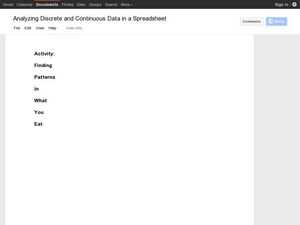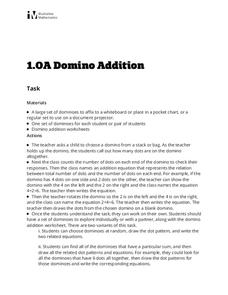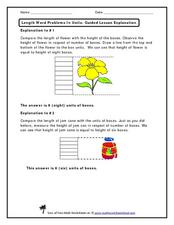Curated OER
Counting to 100: Step-by-Step
Introduce your pupils to the hundreds chart! This pair of worksheets is designed to walk them through the patterns they see in the chart as they count by ones and 10s. They fill in missing numbers on a hundreds chart, using guided steps....
Curated OER
Analyzing Discrete and Continuous Data in a Spreadsheet
You are what you eat! Your statisticians keep a log of what they eat from anywhere between a day to more than a week, keeping track of a variety of nutritional information using a spreadsheet. After analyzing their own data, individuals...
Curated OER
Domino Addition
Hands-on learning in math is essential to all learners, especially youngsters. In a math learning activity, young mathematicians use dominoes in order to discover the commutative property of addition. Fact families and doubles facts can...
Curated OER
The Algebra of Summation Notation
In this algebra worksheet, learners use the summation notation correctly as they solve problems. They define the integral of a function and solve problems involving i. There are 14 questions with an answer key.
Curated OER
Mean and Standard Deviation
Get two activities with one lesson. The first lesson, is appropriate for grades 6-12 and takes about 20 minutes. It introduces the concept of measures of central tendency, primarily the mean, and discusses its uses as well as its...
Curated OER
Multiplication, Division, and Money
In this math review instructional activity, students complete problems involving multiplication, division, money, and equations. Students complete 10 multiple choice problems.
Curated OER
Application and Modeling of Standard Deviation
The first activity in this resource has learners computing the mean and standard deviation of two different data sets and drawing conclusions based on their results. The second activity has them using a dice-rolling simulation to...
Curated OER
Relate Counting to Addition and Subtraction
Use patterns to practice basic addition; pupils count by two, starting from eight and counting on to 20. They record the five numbers missing from the sequence. Below, the instructional activity walks learners through the process they...
Curated OER
Adding and Subtracting Up to 5 Guided Lesson Explanation
A teacher resource, this scripted lesson details how learners can solve addition and subtraction problems involving numbers up to five. The referenced pupil instructional activity is not included.
Curated OER
Decomposing Numbers Step-By-Step
Here are two addition-related exercises. However, bear in mind, the explanations are featured below each of them. Use this as an all-class warm up, revealing the explanations if and when you see fit. First, examine the four sets of...
Curated OER
Matching the Shapes
Which of these blocks match? As they learn about shape attributes and the term same, scholars draw lines from block formations on the left to the same shapes on the right. The eight starting shapes are split into two sections to make...
Curated OER
Addition
Looking for addition drills for your scholars to practice adding one and two-digit numbers? You've found it! Mathematicians examine an example before finding the sum of 16 equations, each of which involves one 2-digit addend and one...
Curated OER
Multiplying by 10
In this multiplying by ten instructional activity, students solve 14 problems in which single digit numbers are multiplied by the number ten.
Curated OER
Composite Functions and Inverse Functions
In this function worksheet, students complete five lessons all with exercise sets, examples, and definitions, and one set of miscellaneous exercises. The concepts covers include: composite functions, inverse functions, graphs of...
Curated OER
I Spy Shapes
All your students have likely played the age-old game "I Spy," and now you can play it in the classroom! A leader (could be you to start) chooses something in the room with a familiar geometric shape. The class begins asking yes or no...
Curated OER
Length World Problems in Units - Guided Lesson Explanation
Rather than a worksheet, this teacher resource is a one-page, scripted answer sheet for a guided lesson on length word problems. First graders are asked to compare the length of a flower and a jar of jam with a number of unit boxes....
Curated OER
Writing Equations in Slope-Intercept Form
Use this worksheet to write equations in both point-slope form and slope-intercept form. Start by writing equations given one point and the slope and finish by writing equations given two points and a few real-world applications. The...
Curated OER
Trina's Triangles
Practice evaluating polynomial expressions at the same time you find Pythagorean Triples. Look for patterns and find examples when the "formula" does and doesn't work. Finally, verify the formula by proving the identity true.
Curated OER
Lengths, Areas and Shapes - Week 9
In this lengths, areas and shapes worksheet, learners explore overlapping and non-overlapping patterns. They identify the number of objects in a pattern, determine how the pattern may be folded to create additional patterns, and...
Curated OER
Shifting Shapes
In this patterns problem solving instructional activity, students draw the 2 missing shapes in 3 sets of patterns. Students also respond to 1 short answer question.
Curated OER
What Will Be Next?
In this temperature worksheet, students analyze 6 Celsius thermometers and write the temperature under each one. Students find the pattern and write the next three temperatures that might come next.
Curated OER
Pascal's Penguins
In this Pascal's Triangle activity, students find missing numbers in a pattern of "triangle penguins." Worksheet has 2 different missing number patterns to solve, each on a different page.
Curated OER
The Family Tree
In this patterns practice worksheet, students read a 3-paragraph excerpt regarding a family tree and respond to 1 graphic organizer question and 1 short answer question.
Curated OER
Graphing Activity
In this probability and statistics worksheet, students work with a family member to construct graphs based on real life data. The two page worksheet contains three questions. Answers are not included.

























